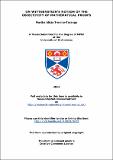On Wittgenstein's notion of the objectivity of mathematical proofs
Abstract
This work analyses and defends Wittgenstein's definition of mathematical objectivity, looking particularly at his account of mathematical proofs, of what makes them normative, and what role mathematical and linguistic practices play in their establishment. It aims to provide a
clearer view of Wittgenstein's idea that the objectivity of proofs is inextricably rooted in empirical regularities, detected within what he calls our 'form of life', and which are in turn constituted by both regularities in nature and regularities in human practices. To accomplish this, the thesis makes an exhaustive analysis of Wittgenstein distinction between proofs and experiments. Drawing from Wittgenstein's philosophy of language, this paper addresses important criticisms that have hindered a serious study of his remarks on mathematics, and
vindicates his arguments as cogent, solid accounts of mathematical necessity and practice. This exploration will show that mathematical proofs do not have to be regarded as tools for the discovery of mathematical truths, of any sort, that depict mathematical facts, but can be
correctly characterised as norms that produce new understanding, forming new concepts to deal with reality, and which ultimately affect the very limits of intelligibility, of what we can think,
express and do. Thus, a philosophically relevant link between mathematical proofs and
possibilities of action is set.
Type
Thesis, MPhil Master of Philosophy
Rights
Creative Commons Attribution-NonCommercial-NoDerivs 3.0 Unported
http://creativecommons.org/licenses/by-nc-nd/3.0/
Collections
Except where otherwise noted within the work, this item's licence for re-use is described as Creative Commons Attribution-NonCommercial-NoDerivs 3.0 Unported
Items in the St Andrews Research Repository are protected by copyright, with all rights reserved, unless otherwise indicated.
Related items
Showing items related by title, author, creator and subject.
-
The lesser names : the teachers of the Edinburgh Mathematical Society and other aspects of Scottish mathematics, 1867–1946
Hartveit, Marit (University of St Andrews, 2011-06-22) - ThesisThe Edinburgh Mathematical Society started out in 1883 as a society with a large proportion of teachers. Today, the member base is mainly academical and there are only a few teachers left. This thesis explores how and when ... -
Proof, rigour and informality : a virtue account of mathematical knowledge
Tanswell, Fenner Stanley (University of St Andrews, 2017-06-22) - ThesisThis thesis is about the nature of proofs in mathematics as it is practiced, contrasting the informal proofs found in practice with formal proofs in formal systems. In the first chapter I present a new argument against the ... -
Introduction to the Special Issue on Lakatos’ Undone Work
Nagler, Sophie; Pillin, Hannah; Sarikaya, Deniz (2022-04-22) - Journal articleWe give an overview of Lakatos’ life, his philosophy of mathematics and science, as well as of this issue. Firstly, we briefly delineate Lakatos’ key contributions to philosophy: his anti-formalist philosophy of mathematics, ...


